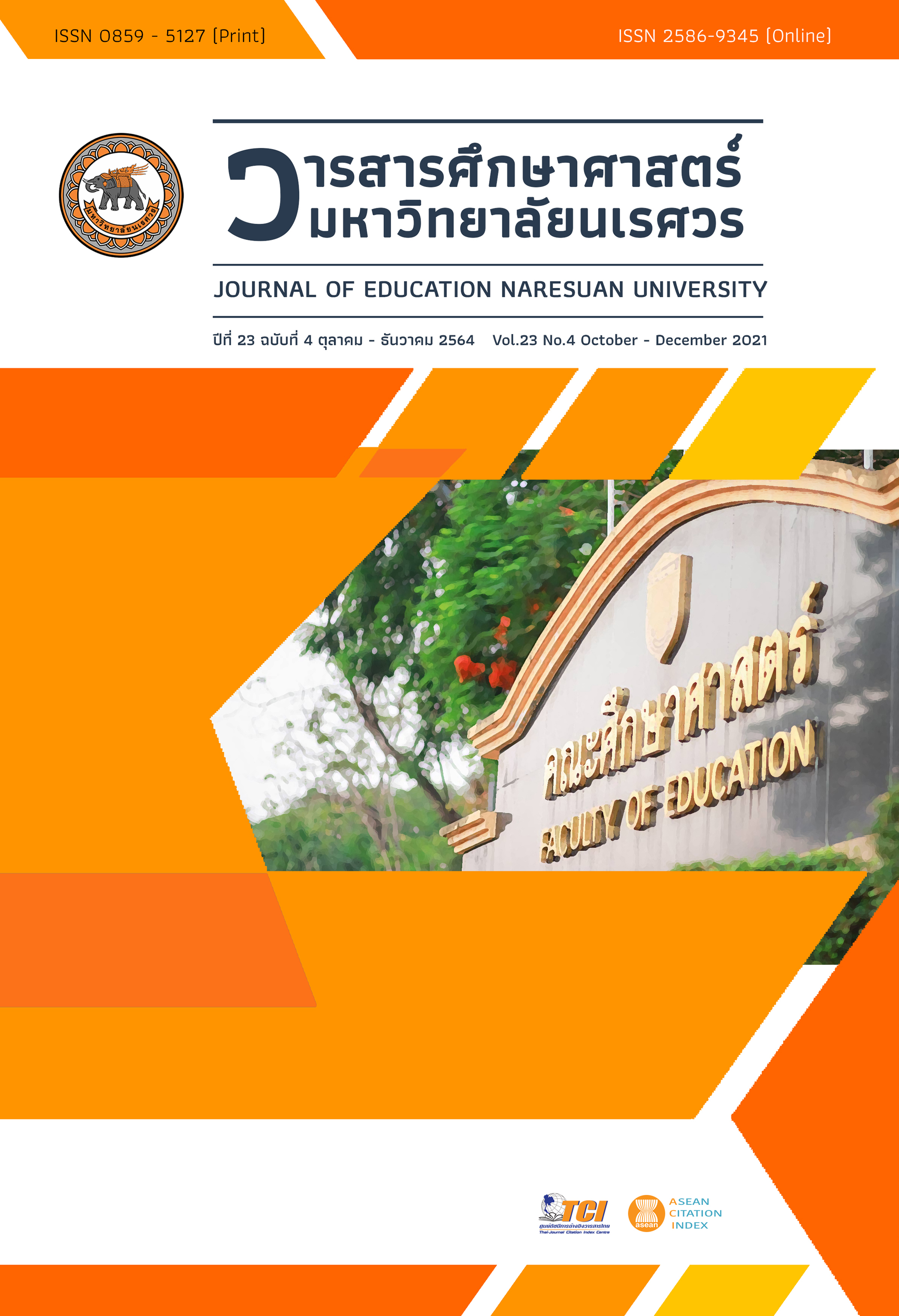การส่งเสริมวาทกรรมพลเมืองเพื่อความเป็นพลเมืองของนักเรียน: การศึกษาเชิงคุณภาพจากชั้นเรียนวิชาสังคมศึกษาระดับมัธยมศึกษาของประเทศไทย HOW TEACHERS FACILITATE CIVIC DISCOURSE TO ENHANCE STUDENTS’ CITIZENSHIP: A QUALITATIVE STUDY OF THAI SECONDARY SOCIAL STUDIES CLASSROOMS
Main Article Content
บทคัดย่อ
การวิจัยนี้มีวัตถุประสงค์เพื่อวิเคราะห์กลวิธีที่ครูสังคมศึกษาใช้ในการอำนวยการระหว่างการอภิปรายในชั้นเรียนระดับมัธยมศึกษา เพื่อพัฒนาให้เกิดวาทกรรมพลเมือง โดยเก็บรวบรวมข้อมูลจากการสัมภาษณ์ครูสังคมศึกษา จำนวน 6 คน บันทึกเสียงและสังเกตพฤติกรรมระหว่างการอภิปรายในชั้นเรียนวิชาสังคมศึกษา จำนวน 8 ห้องเรียน และวิเคราะห์ข้อมูลเชิงคุณภาพตามกรอบการวิเคราะห์วาทกรรมพลเมืองของ Habermas ผลการวิเคราะห์แสดงให้เห็นถึงวิธีการที่ครูใช้ในการส่งเสริมให้เกิดวาทกรรมพลเมืองที่มีคุณภาพทั้ง 4 ด้าน ดังนี้ 1) การเข้าถึง ได้แก่ การตั้งคำถามหลักที่เอื้อให้นักเรียนเข้าร่วมแสดงความคิดเห็น และการใช้เทคนิคต่างๆ ในการดึงนักเรียนเข้าสู่การสนทนา 2) ความเท่าเทียม มีการใช้ทั้งวัจนภาษาและอวัจนภาษาในการสร้างความเท่าเทียมในการอภิปรายในชั้นเรียน 3) การมีเหตุผลและมีวิจารณญาณ แบ่งเป็น 3 รูปแบบ คือ การกระตุ้นให้นักเรียนแสดงความคิดเห็นอย่างเป็นเหตุเป็นผล การกระตุ้นให้นักเรียนอภิปรายโดยมีข้อมูลประกอบ และการพัฒนาทักษะในการแสดงความคิดเห็นของนักเรียน และ 4) การร่วมสร้างข้อสรุป พบว่า ครูเป็นผู้มีบทบาทสำคัญที่สุด แต่ใช้การสรุปในรูปแบบที่แตกต่างออกไป นอกจากนี้ ผลการวิจัยยังชี้ให้เห็นถึงความสัมพันธ์ระหว่างความเชื่อของครูในการสร้างพลเมืองกับการออกแบบการอภิปรายในชั้นเรียนในลักษณะต่างๆ อีกด้วย
Article Details
เจ้าของบทความมิได้คัดลอก หรือละเมิดลิขสิทธิ์ของผู้ใด หากเกิดการละเมิดลิขสิทธิ์ ไม่ว่าวิธีใด หรือการฟ้องร้องไม่ว่ากรณีใด ๆ ที่อาจเกิดขึ้นได้ กองบรรณาธิการวารสารศึกษาศาสตร์ ไม่มีส่วนเกี่ยวข้องทั้งสิ้น ให้เป็นสิทธิ์ของเจ้าของบทความที่จะดำเนินการ
เอกสารอ้างอิง
Aasebø, T. S. (2017). Classroom discussions: Possibilities and limitations for democratic classroom practices. Education Reform Journal, 2(1), 1-16.
Alivernini, F., & Manganelli, S. (2011). Is there a relationship between openness in classroom discussion and students’ knowledge in civic and citizenship education? Procedia-Social and Behavioral Sciences, 15, 3441-3445. https://doi.org/10.1016/j.sbspro.2011.04.315
Avery, P. G., Levy, S. A., & Simmons, A. M. (2013). Deliberating controversial public issues as part of civic education. The Social Studies, 104(3), 105–114.
Boyle-Baise, M., & Zevin, J. (2009). Young citizens of the world: Teaching elementary social studies through civic engagement. New York: Routledge.
Bureau of Academic Affairs and Education Standards. (2010). Civic education Youth power Citizen power: Citizenship Education. Bangkok: Office of the Basic Education Commission. [in Thai]
Carrasco, D., & Irribarra, D. T. (2018). The role of classroom discussion. In Teaching tolerance in a globalized world (pp. 87-101). Springer, Cham.
Cooper, D. (2007). Is civic discourse still alive? Museums & Social Issues, 2(2), 157–163. https://doi.org/10.1179/msi.2007.2.2.157
Farkas, K. R. (2010). Preparing students for active and informed civic discourse. Teaching English in the Two Year College, 38(1), 35.
Farkas, K. R. (2013). Citizen (in) action: The limits of civic discourse in city council meetings. Critical Discourse Studies, 10(1), 81–98. https://doi.org/10.1080/17405904.2012.736702
Habermas, J. (1989). The structural transformation of the public sphere: an inquiry into a category of bourgeois society. Cambridge, MA: MIT Press.
Harris, D. E. (2002). Classroom assessment of civic discourse. Education for democracy: Contexts, curricula, assessments, 211-232.
Holley, L. C., & Steiner, S. (2005). Safe space: Student perspectives on classroom environment. Journal of Social Work Education, 41(1), 49-64. https://doi.org/10.5175/JSWE.2005.200300343
Kuş, Z. (2015). Science and social studies teachers’ beliefs and practices about teaching controversial issues: Certain comparisons. Journal of Social Science Education, 84-97.
Larson, B. E. (2000). Classroom discussion: A method of instruction and a curriculum outcome. Teaching and Teacher Education, 16(5-6), 661-677.
Legate, M. (2018). Civil discourse in the classroom: Preparing for academic and civic participation (Master thesis). Lincoln: Graduate College of University of Nebraska Lincoln.
Lintner, T. (2018). The Controversy over Controversy in the Social Studies Classroom. SRATE Journal, 27(1), 14-21.
McKee, R. J. (2015). Encouraging classroom discussion. JSSE-Journal of Social Science Education, 66-73. https://doi.org/10.4119/jsse-736
Manganelli, S., Lucidi, F., & Alivernini, F. (2015). Italian adolescents' civic engagement and open classroom climate: The mediating role of self-efficacy. Journal of Applied Developmental Psychology, 41, 8-18. https://doi.org/10.1016/j.appdev.2015.07.001
McHugh, M. L. (2012). Interrater reliability: The Kappa statistic”. Biochemia Medica, 22(3), 276-282.
Michaels, S., O’Connor, C., & Resnick, L. B. (2008). Deliberative discourse idealized and realized: Accountable talk in the classroom and in civic life. Studies in philosophy and education, 27(4), 283-297.
Panke, S., & Stephens, J. (2018). Beyond the echo chamber: Pedagogical tools for civic engagement discourse and reflection. Educational Technology and Society, 21(1), 248–263.
Phipps, S. B. (2010). High school social studies teachers' beliefs and education for democratic citizenship (Doctoral dissertation). Retrieved from ProQuest Dissertations & Theses database. (UMI No. 3427163)
Saldaña, J. (2013). The coding manual for qualitative researchers (3rd ed.). Thousand Oaks, CA: Sage.
Schuitema, J., Radstake, H., van de Pol, J., & Veugelers, W. (2018). Guiding classroom discussions for democratic citizenship education. Educational Studies, 44(4), 377–407. https://doi.org/10.1080/03055698.2017.1373629
Schuitema, J., Van Boxtel, C., Veugelers, W., & Ten Dam, G. (2011). The quality of student dialogue in citizenship education. European Journal of Psychology of Education, 26(1), 85–107. https://doi.org/10.1007/s10212-010-0038-1
Schuitema, J., Veugelers, W., Rijlaarsdam, G., & ten Dam, G. (2009). Two instructional designs for dialogic citizenship education: An effect study. British Journal of Educational Psychology, 79(3), 439-461.
Thaewanarumitkul, P. (2008). Civic education. Bangkok: Nanmeebooks. [in Thai]
Vinterek, M. (2010). How to live democracy in the classroom. Education Inquiry, 1(4), 367-380.
Westheimer, J. (2015). What kind of citizen?: Educating our children for the common good. New York: Teacher College Press.
Westheimer, J., & Kahne, J. (2004). Educating the “Good” citizen: Political choices and pedagogical goals. Political Science & Politics, 37(2), 241-247. https://doi.org/10.1017/S1049096504004160


